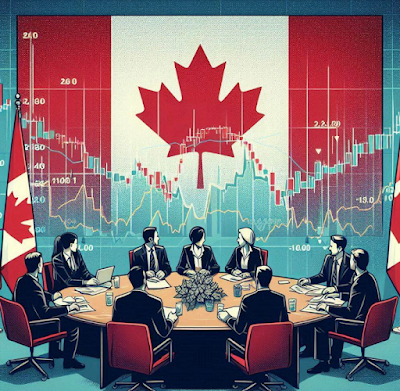The Asian equity markets failed to retain the early gains that had at least partially been fueled by the US equities recouping half of their losses. The MSCI Asia-Pacific Index lost about 1.7% and finished at new 3.5 year lows.
European markets are posting minor gains, with the Dow Jones Stoxx 600 up about 0.25% after hitting 15-month lows yesterday. The gap created by yesterday's lower opening has not been entered. This is also true of several national bourses, including Germany's DAX and the French CAC.
The foreign exchange market is also eerily calm. Most major currencies are little changed against the US dollar and emerging market currencies narrowly mixed. The Canadian dollar is the strongest of the majors, gaining about 0.25% against the greenback. After the Bank of Canada had defied expectations by not cutting interest rates, the Canadian dollar finished the session higher, despite the large drop in oil prices. We suggest that the dramatic narrowing of the Canadian interest rate discount to the US helped explain the Canadian dollar's resilience, The US dollar low for this week was near CAD1.4430, and that is where initial support is pegged.
Tomorrow Canada reports retail sales and CPI. Neither report will likely have much impact on policy expectations. Retail sales, excluding autos, have not risen since June but are forecast to increase by 0.4% in November. We suspect the risk is on the downside. Headline CPI is expected to fall by 0.4%, but last December it fell by 0.7%. This means that the anticipated monthly decline would still see the year-over-year rate increase from 1.4% to 1.7%. A 0.3% decline in the core rate though will keep the year-over-year rate steady at 2.0%.
The Canadian dollar may also be at the mercy of oil prices. Yesterday's API figures showed a 4.6 mln barrel build of inventories, offsetting the 3.9 mln barrel drop the previous week. EIA figures will be released later today, delayed a day due to the US holiday at the start of the week.
The main event today is the ECB meeting. It is unreasonable to expect new action from the ECB after the policy was eased last month. Changes at consecutive meetings are not unprecedented at the ECB. Recall that Draghi reversed Trichet's rate hikes at his first two meetings. However, now that unorthodox policies are being pursued, there is unlikely to be a consensus without seeing the impact of the recent action.
However, the many of the variables that the ECB places emphasis on have worsened. Oil prices are about 25% lower than when it met in December, and on a trade-weighted basis, the euro has risen by more than 4% since early December. Financial conditions more broadly have tightened. Armed with this and the survey of professional forecasters, Draghi is likely to be dovish. What he lacks in urgency, he may compensate with conviction.
If the goal is legitimate, then the means to the end must also be legitimate. Draghi is likely to reaffirm his commitment to using all means at the ECB's disposal to ensure its mandate is met. We anticipate further action around mid-year.
Despite the broader volatility in the capital markets, the euro, with few exceptions, remains largely confined to a $1.08-$1.10 trading range. The two-year differential between the US and Germany is at marginal new lows for the year, and while this is support for the euro, the anticipation of a dovish Draghi may be deterring buyers.
The sharp rise of the yen has sparked some expressions of concern by the government though the BOJ has remained quiet. There has been some speculation of new BOJ action at the meeting at the end of this month. One adviser to Prime Minister Abe seemed to put some pressure on the BOJ by suggesting the conditions are in place for additional steps. Another adviser seems to play this down, suggesting it was too early.
The US reports the Philly Fed survey and weekly initial jobless claims. Weekly initially jobless claims have been trending gently higher since late-November. The four-week average bottomed in late-October near 260k. As of last week, it was near 279k. The Philadelphia Fed survey is expected to be little changed from the December reading of -5.9. The risk is on the downside.
Tags: Bank of Canada,U.S. Initial Jobless Claims










































